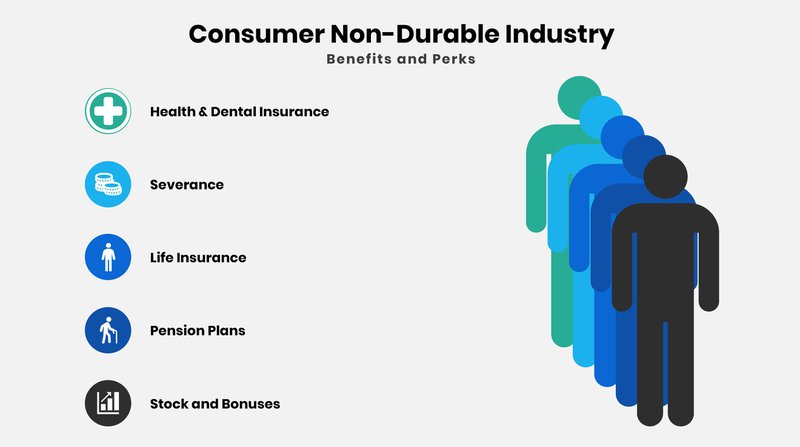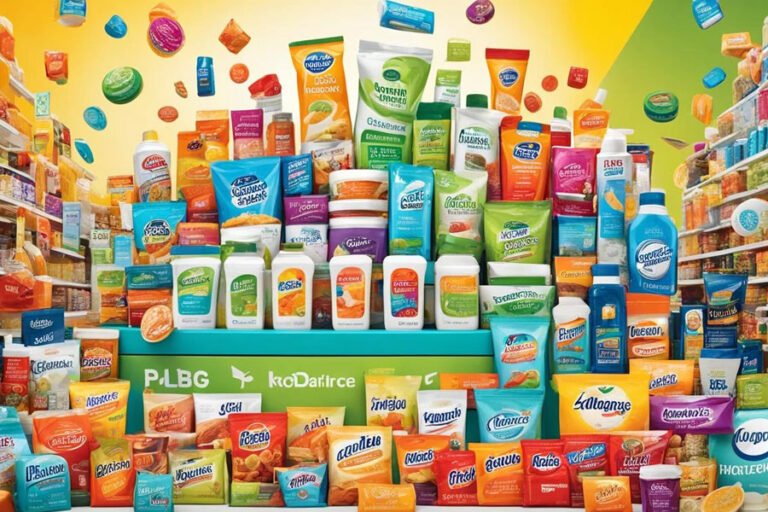In the fast-paced world of consumer goods, there’s a category that keeps our lives running smoothly while often flying under the radar: consumer non-durables. These products, which include everything from food and beverages to personal care items, play an essential role in our daily routines. But have you ever wondered what companies are behind these ubiquitous essentials? As we dive into this comprehensive guide, you’ll discover key players in this dynamic field who shape market trends and influence how we live our lives. Join us on this exploration as we uncover the giants of What Companies Are in the Consumer Non-Durables Field!
Top Companies in the Field
The consumer non-durables field is populated by several industry giants that dominate the market. These companies specialize in products we use daily, from food and beverages to personal care items.
Procter & Gamble leads the way with a diverse portfolio of household brands like Tide and Gillette. Their commitment to innovation keeps them at the forefront of consumer preferences.
 Coca-Cola stands tall as a beverage titan for its iconic soda and an extensive range of drinks appealing to all demographics.
Coca-Cola stands tall as a beverage titan for its iconic soda and an extensive range of drinks appealing to all demographics.
PepsiCo follows closely behind, offering snacks and beverages that resonate globally. Brands like Lay’s and Gatorade have significantly impacted consumers’ choices.
Nestlé is captivated by its vast array of food products, while Unilever balances personal care goods with sustainability initiatives. Each company plays a crucial role in shaping our everyday lives through its offerings.
Company Profiles:
Procter & Gamble Co. is a giant in the consumer non-durables sector. Known for its wide range of household and personal care products, it has established brands like Tide, Gillette, and Pampers that resonate with customers worldwide.
Coca-Cola Co. stands out as a leader in the beverage market. With its iconic soft drinks and extensive product line, Coca-Cola continues to dominate global consumption trends while adapting to health-conscious shifts.
PepsiCo Inc. competes fiercely with Coca-Cola but extends beyond beverages into snacks. Its portfolio includes beloved brands like Lay’s and Gatorade, making it a formidable player across various categories.
Nestlé SA focuses on nutrition and wellness. With an impressive array of food products—from coffee to infant formula—Nestlé emphasizes quality while promoting sustainability initiatives.
Unilever PLC offers diverse offerings ranging from beauty to home care items. Brands such as Dove and Knorr showcase Unilever’s commitment to innovation and responsible sourcing practices within the industry.
– Procter & Gamble Co
Procter & Gamble Co (P&G) is a titan in the consumer non-durables sector. Founded in 1837, this multinational corporation became a global household name.
With iconic brands like Tide, Pampers, and Gillette, P&G caters to diverse consumer needs. Their extensive product range includes personal care items, cleaning agents, and health solutions.

Innovation is at the heart of P&G’s strategy. The company invests heavily in research and development to enhance existing products while introducing new ones that align with changing consumer preferences.
Sustainability also plays a crucial role in their operations. P&G actively seeks eco-friendly practices to reduce environmental impact and improve product recyclability.
Procter & Gamble continues solidifying its position within the competitive landscape of non-durable consumer consumers by focusing on quality and adaptability.
– Coca-Cola Co
Coca-Cola Co is a titan in the consumer non-durables sector. Founded in 1892, it has become synonymous with refreshment. The company’s signature beverage, Coca-Cola, revolutionized the soft drink industry.
Beyond its flagship product, Coca-Cola offers a diverse portfolio of beverages. From Sprite to Fanta and Dasani water, there’s something for everyone. This variety keeps consumers engaged and coming back for more.

Sustainability is also high on Coca-Cola’s agenda. The company has implemented initiatives to reduce plastic waste and improve water efficiency. These efforts resonate well with environmentally-conscious buyers.
Marketing strategies play a crucial role in their success, too. Iconic advertisements have made Coke a part of popular culture worldwide.
With a strong global presence, Coca-Cola continues to adapt to changing consumer preferences while maintaining its classic appeal. It’s not just about drinks; it’s about creating memorable moments together.
– PepsiCo Inc
PepsiCo Inc. is a titan in the consumer non-durables field, renowned for its diverse portfolio. Founded in 1965, it has evolved from a soft drink company into a global leader in snacks and beverages.
The company’s iconic brand lineup includes Pepsi, Mountain Dew, Lay’s, and Quaker Oats. This combination allows PepsiCo to cater to various consumer preferences across different markets.
Sustainability remains at the forefront of its mission. The firm invests significantly in eco-friendly practices and aims to reduce plastic waste through innovative packaging solutions.
Additionally, PepsiCo consistently adapts to changing consumer tastes. Introducing healthier snack options demonstrates its commitment to meeting modern dietary needs while maintaining flavor excellence.
With an impressive international presence, PepsiCo continues expanding its reach and influence within the industry. Its ability to innovate keeps it relevant amidst evolving market dynamics.
– Nestle SA
Nestlé SA stands as a titan in the consumer non-durables sector. Founded in 1866, this Swiss multinational has become synonymous with food and beverage excellence.
With an expansive portfolio, Nestlé offers everything from baby formula to bottled water. Brands like Nespresso, KitKat, and Purina highlight their diverse reach across various markets.
 Sustainability is at the forefront of their operations. The company is committed to reducing its environmental footprint while promoting healthier lifestyles through innovative products.
Sustainability is at the forefront of their operations. The company is committed to reducing its environmental footprint while promoting healthier lifestyles through innovative products.
Their global presence allows them to adapt to local tastes effectively. This strategy not only boosts sales but also fosters strong customer loyalty.
Investment in research and development keeps Nestlé ahead of trends in nutrition and wellness. By focusing on quality ingredients, they aim to meet evolving consumer demands consistently.
– Unilever PLC
A British-Dutch multinational, Unilever PLC is a titan in the consumer non-durables sector. Its diverse portfolio of brands caters to daily needs across food, beverages, cleaning agents, and personal care products.
Founded in 1929 through the merger of a Dutch margarine company and a British soap manufacturer, Unilever has evolved significantly. Today, it boasts iconic brands like Dove, Knorr, Lipton, and Hellmann’s.
Sustainability is at the core of Unilever’s operations. The company actively pursues eco-friendly practices. From reducing plastic waste to sourcing ingredients responsibly—environmental impact matters here.
Moreover, innovation drives their product development strategy. They continuously adapt to changing consumer preferences for healthier options and ethical sourcing.With its strong global presence and commitment to social responsibility, Unilever remains one of the leading forces in the consumer non-durables field.
What Companies Are in the Consumer Non-Durables Field? Growth and Trends in the Industry
When we observe, “What Companies Are in the Consumer Non-Durables Field?” we find that consumer non-durables field is witnessing a dynamic shift. Companies are adapting to changes in consumer preferences and behaviors, especially post-pandemic.
Sustainability has emerged as a key trend. Many brands are investing in eco-friendly packaging and sourcing materials responsibly. Consumers increasingly favor products that align with their values regarding the environment.
Digital transformation plays a crucial role, too. E-commerce growth allows companies to reach wider audiences efficiently. Online shopping habits have stuck around, prompting businesses to enhance their digital presence.
Health and wellness trends also influence the market significantly. Brands are launching organic, low-sugar, or functional products appealing to health-conscious consumers looking for more than basic nourishment.
Moreover, the rise of social media impacts marketing strategies profoundly. Engaging content on platforms like Instagram and TikTok effectively drives brand awareness and customer loyalty while reshaping how these companies connect with their audience.
Challenges and Opportunities for Companies in the Field
The consumer non-durables field faces a myriad of challenges. Supply chain disruptions can hinder product availability, forcing companies to rethink their logistics and sourcing strategies. Changes in consumer preferences also require constant adaptation. Brands must stay agile to meet the demand for sustainable and ethical products.
However, these hurdles come with opportunities. The growing emphasis on sustainability opens doors for innovation in packaging and product formulations. Companies that invest in green technologies can differentiate themselves from competitors.
Digital transformation is another avenue worth exploring. E-commerce growth allows businesses to reach wider audiences while optimizing customer engagement through data analytics.
Furthermore, embracing health-conscious trends presents chances for expansion into organic and functional foods or personal care items. By addressing these challenges head-on, companies can carve out new niches within the evolving market landscape.
Impact on Consumers and Society
The consumer non-durables field plays a pivotal role in daily life. Products like food, beverages, and personal care items form the backbone of everyday consumption.

These goods are integral to convenience. They cater to fast-paced lifestyles by providing quick meals and personal hygiene solutions.
Additionally, brand loyalty thrives within this sector. Consumers often develop strong connections with their favorite products, influencing purchasing behavior across generations.
However, it’s not all positive. The environmental impact of packaging waste is significant. Many companies face scrutiny over sustainability practices.
Socially responsible brands can shape public perception and encourage healthier lifestyle choices among consumers.
Buyers prioritizing ethical considerations in their purchases increasingly demand transparency regarding ingredients and sourcing.
This shift fosters a more informed society that values quality alongside convenience.
Conclusion: The Future of Consumer Non-Durables Companies
The future of non-durable consumer companies looks promising but also complex. Brands are pressured to adopt sustainable practices as consumers become more environmentally conscious. This shift opens up avenues for innovation, reflecting a demand for eco-friendly products and packaging.
Technological advancements are reshaping the landscape as well. Companies that leverage data analytics can better understand consumer preferences and tailor their offerings accordingly. E-commerce continues to expand its reach, allowing these businesses to connect directly with customers like never before.
Challenges remain in the form of fierce competition and fluctuating market demands. The economic climate can affect spending habits and influence brand loyalty. Nevertheless, those who adapt swiftly stand to gain significant advantages.
As we look ahead, collaboration within the industry may play a crucial role in navigating these changes effectively. Partnerships focusing on sustainability initiatives could enhance reputations while addressing pressing global issues.
The world of consumer non-durables is ever-evolving—driven by innovation, societal expectations, and emerging technologies. Businesses that stay attuned to these dynamics will survive and thrive in this vibrant sector.

